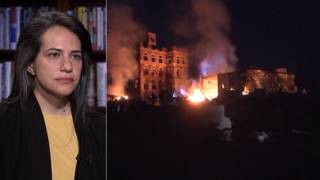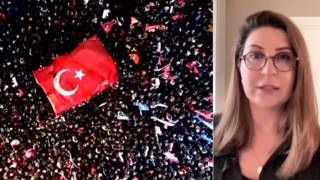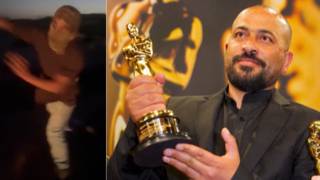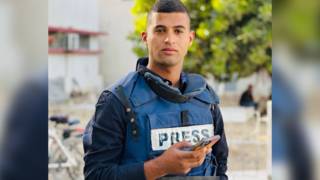
Israelis celebrated the return of the four hostages in Saturday’s raid. The four hostages — Noa Argamani, Almog Meir Jan, Andrey Kozlov and Shlomi Ziv — were all in good medical condition. Just hours after the rescue, thousands of Israelis gathered in Tel Aviv and other cities to protest Netanyahu’s government and to call for a deal to free the remaining hostages. We speak to Ami Dar, an Israeli social entrepreneur based in New York, who supports the exchange of hostages and prisoners and a permanent ceasefire deal. “Let’s get all the hostages back, and if that means that every single detainee and prisoner, Palestinian, is freed, then so be it. Life comes first,” says Dar, the executive director of Idealist.org. We also hear more from Maoz Inon, an Israeli peace activist whose parents, Bilha and Yakovi Inon, were killed in the October 7 Hamas attack on Israel. “We are not going to compromise for anything less than a lasting peace,” he says.
Transcript
AMY GOODMAN: In New York, we’re joined by Ami Dar, executive director of Idealist.org, also an Israeli. I’m wondering if you, too, can respond to what happened this weekend, how it’s been portrayed in the United States, and Ben-Gvir, who’s, now that Benny Gantz has quit the war cabinet, saying he wants to be put into the war cabinet, saying that this freeing of the four hostages — Hamas says three others, including an American, were killed — but Ben-Gvir says this shows that the rescue operation means that military pressure, not a deal, is how to free hostages. Ami?
AMI DAR: Well, good morning. Thanks for having me.
First, I just want to say that I’m in awe of Maoz Inon. I think he’s been one of my moral heroes since the start. I think having your parents murdered and then working for peace, I’m in awe of him and of people like him in Gaza who are in the same situation, who have lost their families, and they keep talking about peace. I think they’re the true heroes here.
I think that, like everyone who spoke here so far, it was a — in the morning, when I heard that the four — I first heard that the four hostages had been rescued a few minutes after it happened. So, obviously, there’s a feeling of relief for the families of those people and for the four people themselves. This is not, you know, their fault. They should have never been taken. And so it was wonderful that they went back. As the day progressed and the news came out of, you know, the scope of the operation and the number of people who had been died and wounded, I was progressively horrified the whole day.
But then, this is part — I think, as Maoz was saying, this is part of the last eight months. I mean, I think that, you know, on October 10th, I went on Twitter, and I said, you know, revenge is not a strategy, and I grieve for their kids as much as I grieve for ours. And our tears taste the same, and our blood is the same color. I mean, that has to be the approach, which is why people like Maoz and people like me have been calling for what’s been called in Israel an “all for all” exchange, from the very, very beginning. The very first week, Israel should have acknowledged, “Look, we lost this round, basically. And now we have to pay the price.” The price is: Life comes first. Life always comes first. Let’s get all the hostages back. And if that means that every single detainee and prisoner, Palestinians in Israeli prisons, is released, then so be it. Life comes first. That’s been my position from the very beginning, and it’s still my position now. And, you know, when you say these things, you get attacked from sort of every side. It doesn’t change it.
And I think what pains me the most is that this will end with a deal. We all know this. We’ve all been around. This will end with a deal. And I keep thinking — Amy, you and I are both old enough — I remember John Kerry testifying in Congress in the early '70s and saying, you know, “How do you tell the last man to die that he died for a mistake?” And who will be the last Israeli, the last Palestinian to die hours before this deal gets made? Because there will be a deal. So do the deal. Just get it done. Both Sinwar in Gaza and Netanyahu in Israel, just do the damn deal. Sorry, I'm not a professional; I’m just here. Sorry for using that word. I’m also not representing Idealist; I’m just representing myself. But just do the deal. Get it done. Get everyone home, Palestinians and Israelis.
AMY GOODMAN: And what do you think of Netanyahu being invited by the U.S. Congress, by the House speaker, but also the man who criticized him, Chuck Schumer? It might have surprised many that he did criticize Netanyahu, but he did. But now you have Hakeem Jeffries, Schumer, House Speaker Johnson all inviting him to give an address to a joint session of Congress.
AMI DAR: Yeah, I think I understand why they’re doing it, in the sense that I think they’re doing it as — you know, I have a 4-year-old at home, and I know that if I give her a piece of chocolate, she may do something that I want her to do. I think they’re trying to offer him a very big piece of chocolate to try to get him to do what they want him to do. I think — let me just start from the end — it will be absolutely disgraceful for him to address Congress without a deal having been done already — I mean, that would be, honestly, insane — without him saying that he is for a deal, without actually him saying that he’s for the whole deal that Biden is proposing, which is this whole two-state solution, you know, the whole thing. Having him there without that, I think, is going to be a disgrace. And I also suspect it’s going to be a disaster for him. I don’t think that the whole of Congress will just take this quietly. I think this is not going to end well if it’s done without actually something to celebrate.
AMY GOODMAN: And, Maoz, the significance of President Biden — and I’ll ask you this question, Ami, as well — promising Israel now something like a billion dollars of military weapons as this assault continues and intensifies in Gaza?
MAOZ INON: [inaudible] and support Israel can receive. Israel needs to receive an aid, aid to be cured from our trauma, reconciliation aid, shared future and peace aid. We don’t need more military weapons. We don’t need to have our bunkers supplied with bombs.
And I want to — again, Ami, it’s a pleasure and honor to be with you in this same panel. And what I realized and I believe now is that the only war which is won is war which leads to peace. And Israel, I’m afraid to say, lost all its wars under the prime ministry of Benjamin Netanyahu. He is the worst leader Israel ever had, and probably the worst leader the Jewish people ever had. And we must stop in his position, and we start a new leadership. And if we’ll need the assistance and the aid of the American people, of both Congress and Senate, from the Republicans and the Democratic Party, to support us to win, to win a war after 30 years of defeats. And to win a war means to make peace. This is the only way for the future. This is what we deserve. And we are not going to compromise, again, on a ceasefire. We are not going to compromise for anything less than a lasting peace.
AMY GOODMAN: And, Ami, if you can, in this last 30 seconds we have — you’re here in the United States; you’re an Israeli — address both audiences?
AMI DAR: I think that the single — in 30 seconds, I think anyone who’s outside of the whole region who wants to actually see peace win, I don’t think it’s possible for Israel to win. I don’t think Palestinians can win. I think only peace can win. Any side “winning,” in quotes, means the whole region loses. Only peace can win. And so, do whatever you can to support those people on both sides across the region who are doing what they can to get people together. Anything bringing people together is good. Anything pulling people apart is bad. Support those who are trying to make people come together, and maybe we come out of this. Maybe. I’m not optimistic.
AMY GOODMAN: Ami Dar, executive director of Idealist.org, and Maoz Inon, lost both his parents in the October 7th attack, calling for peace, also many of his friends. I’m Amy Goodman. Thanks for joining us.











Media Options